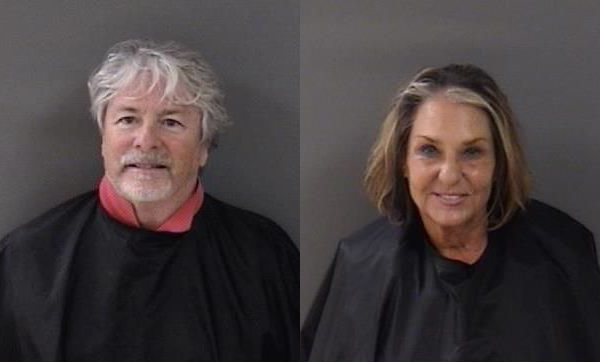The Fourth District Court of Appeals has ruled in the case involving former Sebastian City Council Members Damien Gilliams and Pamela Parris, both recalled from public office in 2021 after ten months and charged with perjury and Sunshine Law violations.
The court reversed one charge of perjury for both Gilliams and Parris.
With the appeals court decision, the jail sentence for the Sunshine Law violations will remain the same. However, there will be a change for the perjury charges.
Gilliams, who owns the No Name Bar in Sebastian, had one charge of perjury, which was dropped, therefore his sentence was reduced.
Parris had two perjury charges, one dropped by the appeals court, but her jail sentence remains the same. According to the original sentencing by 19th Circuit Court Judge Michael Linn, her sentence for the perjury charges ran concurrent.
After reviewing the sentencing and the appeals court ruling, it is our understanding that the new sentencing is as follows:
- Gilliams will now serve 45 days (1 1/2 months) in jail, $2,500 in fines, restitution of $26,098.50, and court costs of $343.
- Parris will serve 90 days (3 months) in jail plus $2,500 in fines, restitution of $26,098.50, and court costs of $343.
Gilliams and Parris still have 15 days to file a rehearing.
“The scenario in this case is alarming. Three duly elected members of the Sebastian City Council who were not allowed to privately discuss foreseeable government issues did so anyway. They decided amongst themselves—as their personal protest to the mayor and city manager’s decision to cancel a regularly scheduled city council meeting because of Covid—to enter the city council chambers and conduct the cancelled meeting anyway. Armed with a government-issued pass key, and in unlit city council chambers, these three city councilmembers took to the dais and purported to take official action at what in essence became a spontaneous, non-announced meeting of the three of them that lasted until the police showed up. That imprudent action was itself a flagrant violation of the Sunshine Law and a reading of the statute makes this conclusion abundantly clear. Whether two or more officials privately discuss, in any manner whatsoever, a foreseeable issue of any magnitude, inside the other’s office or at a coffee shop or in the spectator audience of a child’s soccer match or at a statewide education conference or by quick text or whether they do so through surrogates (such as aides, friends, relatives, other government officials) or whether, as in this case, they decide to spontaneously convene an unannounced rally or meeting, so long as two or more are involved, these are all distinctions without a difference. And every individual unauthorized private discussion between two or more officials along the way constitutes an individual statutory crime against each person with each separate charge carrying a possible penalty of 60 days in the county jail. Plus a $500 fine. Plus substantial court costs. Plus six months of probation. Per act. And notably, in the State of Florida, no statutory sentencing guidelines exist for these types of crimes, and consecutive jail sentences and consecutive probationary periods are permitted and within the unfettered discretion of the trial judge,” the court said.
“It seems unlikely, in this unfortunate series of events, that former Sebastian City Councilmembers Pamela Parris and Damien Gilliams would have ever thought it imaginable that they would now be appealing criminal convictions for which they have been sentenced to serve jail time of two months and six months, respectively. My guess is, that in retrospect, they would have run away and resisted any temptation to get caught up in the excitement of the moment . . . as, unfortunately, they ultimately did. These recent Indian River County Sunshine Law prosecutions and convictions illustrate actual examples of popularly elected local governing body officials being ordered to do real jail time in a real Florida county jail for the commission of a real Florida crime. Of course, whether elected or appointed is of no consequence. The Florida Sunshine Law applies equally to all,” according to the court’s opinion.
Parris has argued that she was confused about whether the regularly scheduled meeting was canceled before attending the illegal one.
“We hold sufficient evidence showed that Parris made a false statement when she asserted that she had received numerous phone calls and emails from the city manager on April 22. At trial, the state’s evidence included phone records showing that the city manager never called Parris on April 22. Arens’s statements and questions, and Parris’s responses, read in context, indicate Parris was asserting that the city manager called her several times on April 22 and gave her conflicting information as to whether the meeting was canceled. Based on these ‘mixed messages,’ she thought the April 22 meeting was still on, and she went to city hall. As the prosecutor showed the jury, Parris’s statements conflicted with what the phone records actually showed,” the appeals court wrote.
Gilliams and Parris were elected in November 2019 and removed during the Sebastian recall by nearly 94 percent of the Sebastian residents who voted on September 15, 2020.
On May 27, 2021, a jury found them guilty on charges of perjury and violating the Sunshine Law while serving as Sebastian City Council members.
On September 14, 2021, 19th Judicial Circuit Court Judge Michael Linn sentenced Gilliams and Parris.
Sebastian is the only city in the nation to recall a majority of public officials from a city council.
